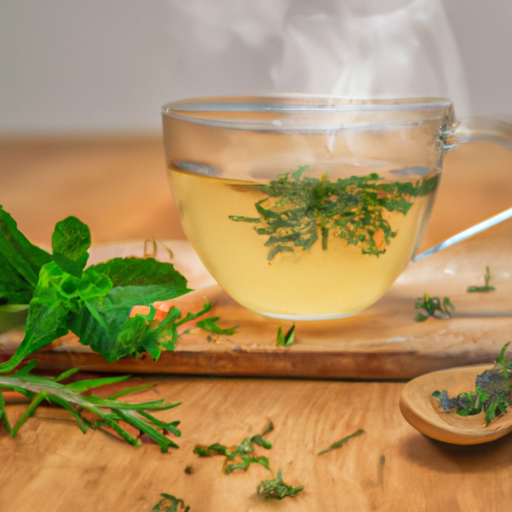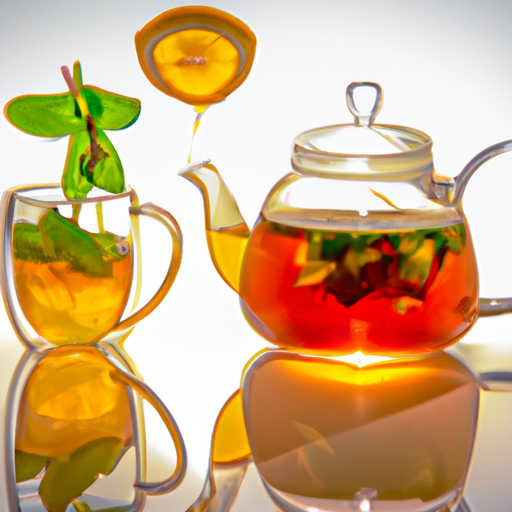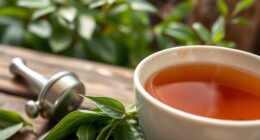Are you tired of feeling bloated and uncomfortable after meals? Are you looking for a natural solution to calm your digestive system? Search no more! This article delves into the realm of herbal teas and their amazing digestive benefits.
These delightful beverages offer a gentle and effective solution to ease common digestive issues. Herbal teas have been used for centuries as a natural remedy for various ailments, including digestive problems. They are known for their soothing properties and ability to promote healthy digestion.
With a wide range of options available, it can be overwhelming to choose the right herbal tea for your needs. Fortunately, I have done the research for you! Through careful analysis and evidence-based findings, I have identified seven herbal teas that are particularly beneficial for digestion.
From the calming effects of chamomile tea to the invigorating properties of ginger tea, each has its unique way of promoting a healthy digestive system. So, whether you suffer from occasional indigestion or chronic digestive issues, join me on this journey as we explore the wonders of herbal teas and discover which one is perfect for you.
Get ready to sip your way to a happier, healthier digestive system!
Key Takeaways
- Chamomile tea has anti-inflammatory properties and soothes the digestive tract.
- Peppermint tea relaxes gastrointestinal muscles and relieves indigestion, nausea, and heartburn.
- Ginger tea reduces inflammation in the gut and stimulates digestive enzyme production.
- Fennel tea stimulates digestion, reduces gas and bloating, and relieves constipation.
Chamomile Tea
If you’re looking for a herbal tea to soothe your digestion, chamomile tea is an excellent choice. Chamomile tea is known for its numerous health benefits, including its positive effects on digestion. It has been used for centuries to ease stomach discomfort and promote healthy digestion.
Chamomile tea contains compounds that have anti-inflammatory properties, which can help reduce inflammation in the digestive tract and alleviate symptoms such as bloating and gas. Additionally, chamomile tea has been found to have a calming effect on the body, making it a popular choice for those looking to improve sleep quality.
So, if you’re dealing with digestive issues or simply want to promote overall digestive health, chamomile tea is worth a try. Moving on to peppermint tea, another herbal tea known for its digestive benefits…
Peppermint Tea
Peppermint tea, renowned for its soothing properties, aids in the smooth functioning of the digestive system. Here are four key benefits of peppermint tea:
-
Relieves Indigestion: Peppermint tea helps relax the muscles of the gastrointestinal tract, reducing symptoms like bloating, gas, and stomach discomfort.
-
Eases Nausea: The menthol in peppermint tea has a calming effect on the stomach, alleviating feelings of nausea and vomiting.
-
Reduces Heartburn: By reducing muscle contractions in the esophagus, peppermint tea can help relieve the burning sensation of heartburn.
-
Promotes Bowel Regularity: Peppermint tea acts as a natural muscle relaxant, helping ease constipation and promoting regular bowel movements.
To make peppermint tea, simply steep 1-2 teaspoons of dried peppermint leaves in boiling water for 5-10 minutes. Then, strain and enjoy its refreshing taste.
Moving on to ginger tea, another herbal remedy for digestion…
Ginger Tea
When you brew ginger tea, it brings a warm and soothing sensation to your digestive system, providing relief from discomfort. Ginger has been used for centuries as a natural remedy for digestive issues such as indigestion, nausea, and bloating. It contains compounds like gingerol and shogaol, which have anti-inflammatory properties that can help reduce inflammation in the gut.
Additionally, ginger has been found to stimulate the production of digestive enzymes, aiding in the breakdown and absorption of nutrients. To make ginger tea, simply steep fresh ginger slices or grated ginger in hot water for about 10 minutes. You can also add a squeeze of lemon or a touch of honey for added flavor.
Now, let’s move on to the benefits of fennel tea.
Fennel Tea
Fennel tea is a herbal tea that’s known to have several digestive benefits. It’s believed to reduce gas and bloating, making it a popular choice for those with digestive issues. Additionally, fennel tea is said to relieve constipation, promoting regular bowel movements. These benefits make fennel tea a great option for improving digestion and overall gut health.
Reduces Gas and Bloating
To soothe your stomach and relieve uncomfortable bloating, sip on a warm cup of herbal tea that gently eases away the excess gas, leaving you feeling light and refreshed. Here are four reasons why fennel tea is known for its gas-reducing properties:
-
Fennel tea contains compounds that stimulate digestion and help break down food more efficiently, reducing the chances of gas formation. This is why dietary changes for better digestion are recommended.
-
Certain yoga poses, like the seated forward bend and the wind-relieving pose, can help alleviate gas and bloating. When combined with fennel tea, these poses can provide even greater relief. So, incorporating yoga poses for improving digestion is beneficial.
-
Fennel tea has carminative properties, which means it helps to relax the muscles of the digestive tract, allowing trapped gas to be released more easily. This is why it is known for its gas-reducing properties.
-
Fennel tea contains anti-inflammatory compounds that can help reduce inflammation in the digestive system, relieving gas and bloating. These anti-inflammatory effects contribute to its effectiveness in reducing gas.
Transitioning into the next section, fennel tea not only reduces gas and bloating but also provides relief from constipation.
Relieves Constipation
Ease your discomfort and experience a sense of relief as fennel tea gently relieves constipation, helping you feel lighter and more energized. Fennel seeds contain compounds that stimulate digestion and act as a natural laxative, promoting bowel movements and relieving constipation. This herbal remedy for indigestion has been used for centuries to ease digestive discomfort and improve overall digestion. Fennel tea can be brewed by steeping one teaspoon of crushed fennel seeds in a cup of hot water for 10 minutes. Drinking this tea after meals can help prevent constipation and promote regularity. Incorporating natural ways to improve digestion, like fennel tea, into your routine can have long-lasting benefits for your overall well-being. Transitioning into the next section, licorice root tea provides additional herbal support for digestive health.
Licorice Root Tea
Licorice root tea is a delicious and soothing herbal option for improving digestion. Licorice root has been used for centuries in traditional medicine for its numerous health benefits. It contains compounds that can help relieve constipation and promote regular bowel movements. Licorice root has a gentle laxative effect, which can help soften stools and ease the passage of waste through the digestive system.
Additionally, licorice root has anti-inflammatory properties that can help reduce inflammation in the digestive tract and soothe symptoms of digestive disorders like gastritis and ulcers. However, it’s important to note that licorice root should be consumed in moderation as excessive intake may lead to side effects such as high blood pressure and low potassium levels.
Now, let’s move on to discussing the benefits of dandelion root tea for digestion.
Dandelion Root Tea
Dandelion root tea, with its earthy flavor and numerous health benefits, can be a wonderful addition to your daily routine for improving digestive health. This herbal tea has been used for centuries to aid digestion and promote overall well-being.
Here is a table that highlights some of the health benefits of dandelion root tea:
| Health Benefits of Dandelion Root Tea |
|---|
| Aids digestion |
| Supports liver health |
| Reduces bloating |
| Boosts immune system |
To prepare dandelion root tea at home, simply follow these steps:
- Boil water in a kettle.
- Add 1 teaspoon of dried dandelion root to a cup.
- Pour the boiling water over the dried root.
- Let it steep for 5-10 minutes.
- Strain the tea and enjoy!
Moving on to the next topic, lemon balm tea has its own unique benefits for digestion.
Lemon Balm Tea
Moving on to the next topic, lemon balm tea brings its own unique set of benefits to improve the health of your digestive system.
Lemon balm tea has been used for centuries as a natural remedy for various digestive issues. It’s known for its calming properties, which can help to relax the muscles in the digestive tract, reducing cramping and discomfort. Additionally, lemon balm tea has been found to have antimicrobial properties, which can help to combat harmful bacteria in the digestive system.
To make lemon balm tea at home, simply steep a handful of fresh lemon balm leaves in hot water for about 10 minutes. You can also add a squeeze of lemon or a drizzle of honey to enhance the flavor.
Incorporating lemon balm tea into your daily routine can be a simple and effective way to support a healthy digestive system.
Frequently Asked Questions
Are there any potential side effects or interactions of herbal teas for digestion?
There may be potential risks and interactions with herbal teas for digestion. It is important to consult with a healthcare professional before trying any herbal tea alternatives to ensure their safety and effectiveness.
Can herbal teas be used as a long-term solution for digestive issues?
While herbal teas can provide temporary relief for digestive issues, they may not be a long-term solution. Over-the-counter medications may offer more effective and targeted relief. However, incorporating herbal teas into a holistic approach to digestive health can have potential benefits.
How often should I drink herbal tea for optimal digestive health?
For optimal digestive health, it is beneficial to incorporate herbal tea into your daily routine. It can improve digestion and alleviate digestive issues. To choose the right herbal tea, consider your specific digestive needs and consult with a healthcare professional.
Are there any specific conditions or ailments that herbal teas for digestion may not be suitable for?
There are common misconceptions about herbal teas for digestion, but they can be unsuitable for certain conditions. Stress plays a role in digestive health, and herbal teas can help alleviate symptoms.
Can I combine different types of herbal teas for digestion to enhance their effects?
Yes, combining herbal teas can enhance their effects as alternative remedies for digestion. It is important to choose teas with complementary properties such as peppermint for soothing and chamomile for reducing inflammation.
Conclusion
In conclusion, when it comes to herbal teas for digestion, there are several options to choose from.
Chamomile tea, with its soothing properties, can help calm an upset stomach.
Peppermint tea can aid in relieving indigestion and bloating.
Ginger tea is known for its ability to ease nausea and promote digestion.
Fennel tea can help alleviate gas and stomach cramps.
Licorice root tea has been used traditionally to support healthy digestion.
Dandelion root tea may stimulate digestion and liver function.
Lastly, lemon balm tea can have a calming effect on the digestive system.
Just like a well-balanced meal, finding the right herbal tea can be a comforting and harmonious experience for your digestive system.










